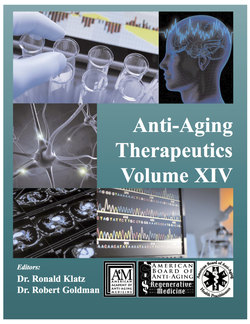Читать книгу Anti-Aging Therapeutics Volume XIV - A4M American Academy - Страница 65
На сайте Литреса книга снята с продажи.
TOXICITY OF IODINE
ОглавлениеThe main sources of toxic iodine exposure are:
•Drugs and supplements such as amiodarone (Cordarone®, Pacerone®), oral potassium iodide (SSKI), Lodoral®;
•Salt fortification quality control issues, mostly in third world countries;
•Secondary exposure to iodine as a water purifying agent;
•Exposure from use of iodine as a contrast agent.
Iodine toxicity can occur in three different ways: from simple chronic overexposure; from an increase of iodine in a population with a previously stable but low intake; or from a single bolus dose. It is important to note that those with historical iodine deficiencies (even slight) and those with latent thyroid antibodies, are especially susceptible to iodine toxicity.26
Individuals from populations lacking iodine in their diet can manifest toxicity with additional doses as low as 50-100 μg daily. While this is possible, toxicities are more common with consumption of higher levels in excess of 1000-1100 μg daily for months.
Iodine toxicity disrupts thyroid function by causing a combination of goiters, nodules, hypothyroidism, or hyperthyroidism. Iodide induced thyrotoxicosis, the Jod-Basedow phenomenon, can be induced with even moderate doses of iodide in individuals with low intakes of iodine. High doses of iodine, such as those used in iodine based radiocontrast agents have been documented to cause the Jod-Basedow phenomenon. Conversely, hypothyroidism may occur if the Wolff-Chaikoff effect, in which there is a protective shut down of thyroid hormone synthesis in the presence of too much iodine, fails to be self limiting.
Patients exposed to isolated very large amounts of radiographic contrast dyes or the drug amiodarone also are prone to manifest abrupt side effects, especially hyperthyroidism. This is the most common mechanism of onset for toxic nodular goiter in older males.
Chronic iodine intake generally above 5000 μg daily can also cause non-thyroidal symptoms including a metallic taste in the mouth, increased salivation, gastrointestinal side effects, and acneiform skin lesions.26 Given the efficient renal clearance of iodine, non-thyroidal side effects tend to be self-limiting. The most troubling thing about thyroidal iodine side effects is that permanent damage to thyroid function can be done through provocation of latent antibodies to thyroid proteins. Of course, once the autoimmune process is started, it is often not reversible.
